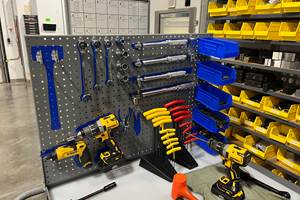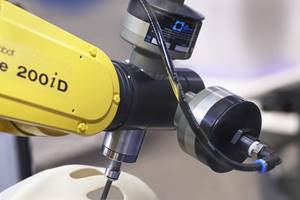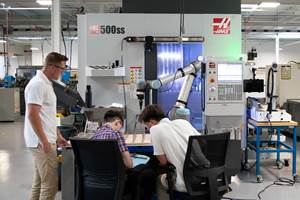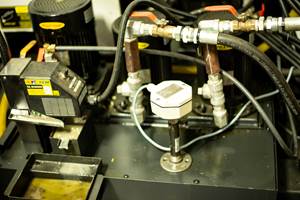Automating The Mold Shop
This shop produces dies and molds around the clock 7 days a week, yet most of the time no one is there.
Share





During the past 12 months, an alarming number of tool, die and mold shops in the United States have gone out of business—nearly 100 in the Chicago area alone, by one industry observer's unofficial count. The slump in manufacturing following 9/11 was, and continues to be, a contributing factor, but the root cause is the increasing amount of die and mold work that is going to lower-priced overseas sources, particularly China.
How can U.S. die and mold shops compete against low-cost overseas sources? Stolle Technology, Inc., a fledgling die and mold shop in Winston-Salem, North Carolina, is doing it with automation. The 20-employee shop enjoyed a 38 percent increase in sales last year, and it expects to ring up another 20 percent increase this year. The shop operates only one attended shift, but automation keeps the machines running around the clock 7 days a week, making for low costs, high quality and very competitive delivery times.
Manfred Stolle, president of the firm, learned the mold-making business at several die and mold shops in Germany and Canada and then took a position with a firm in North Carolina. That's where he met his wife, Barbara, who was a Sara Lee executive. Soon after their marriage, they decided that the combination of his mold-making expertise and her financial management savvy would enable them to succeed in a mold-making business of their own. Accordingly, the couple set up shop in a 2,000-square-foot facility in Winston-Salem, starting with a milling machine, a grinder and an EDM.
The Stolles succeeded in finding jobs. They doubled the size of the shop, to 4,000 square feet. They also added two GFAGIECHilles wire EDMs (a Robofill 290 AWT and a Robofill 290 AWT P) and two GFAGIECHilles Roboform 35 CNC die sinking machines. "Our customers really determined the type of new equipment we acquired initially," Mr. Stolle adds, to explain the concentration on EDMs. "The molds that we build require a lot of EDMing—sharp corners, pockets that are too deep to produce with a small end mill, and similar features that we couldn't generate by milling."
As Stolle Technology grew, the Stolles put a lot of thought into the kind of mold-making firm they needed to be. "We're competing in a global market, against countries where labor costs are much, much lower," Mr. Stolle says. "In order to compete, we have to wring as much of the labor cost out of the job as possible. The only way to do that is by using automation."
"There was a brief period where we tried to grow the business the old fashioned way, by operating a second shift," adds Barbara Stolle. "You not only need more people to operate a second shift, but you need better people because they are working under less supervision. After 9 months, we abandoned the idea of a second shift and began looking at automating our operation."
After 4 years, Stolle Technology needed larger quarters. It found what it was looking for in a vacant, 18,000-square-foot tire warehouse in Winston-Salem, about 5 miles from the initial location. After substantial modifications, the firm moved to its new facility.
For Stolle Technology, automation means taking the steps necessary to enable the equipment to run 24 hours per day, 7 days per week. "We operate one manned shift," Mr. Stolle explains. "But our operators don't simply stand around for 8 or 10 hours watching the equipment run. Instead, they spend their time preparing programs, doing setups, loading electrodes and anything else needed to enable their machines to run around the clock. Doing so reduces the labor cost for each job and, because we can get more jobs finished in a 24-hour period, we are able to reduce delivery time to the customer.
"The days of 12- to 14-week delivery are gone," he continues. "Overseas companies have thousands of employees that they can throw at a project to turn out entire families of molds in 8 weeks. That's really where the competition is: delivery time.
"Lead time is half what it used to be, and to provide competitive lead times, a company must run 24/7," Mr. Stolle stresses. "But we cannot afford to man shifts around the clock. Even if we wanted to—and we don't—we wouldn't be able to find enough qualified workers. The objective for our staff is to get the programming and setups finished by the end of the work day to enable the machines to run unattended until we come back the following day.
"Same thing goes for weekends," he continues. "The schedule calls for the machines to be ready by Friday afternoon or Saturday morning to run the rest of the weekend without anyone in attendance."
Stolle Technology anticipated the need to run for long periods unattended when it purchased its two Roboform 35 EDM sinkers. Each machine has a 32-electrode magazine and toolchanger that permit complete EDMing of the most complex workpieces. The machine is particularly effective for producing multi-cavity molds.
Each machine also incorporates a number of control features designed to prevent interruptions: A Pilot-Expert supervision system allows autonomous operation of the machine and ensures perfect reproducibility of machining jobs; a SPAC (System of Protection Against short Circuits) increases output by eliminating short circuits; a Power Control Expert continuously determines the ideal machining current according to the active surface of the electrode; and a Micro-Machining sparking circuit combines fineness of detail with efficiency.
As Stolle Technology's around-the-clock operation continued to grow, the increased work load started to strain the capacity of the shop's two sinker EDMs. To head off a bottleneck at this critical operation, the shop ordered still another Roboform 35. Unlike the first two machines, however, the new machine—the first new machine to be installed at the company's new location—was equipped with a GFAGIECHilles QCRi (a stand-alone, quick-change robot).
The shop's first two Roboform 35s provide a combined capacity of 64 electrodes. The third sinker, equipped with the QCRi robot (photo on page 84), can accommodate an additional 90 electrodes, which increased the shop's total capacity at any given time to 154 electrodes. In addition to the 90 electrodes, the robot's magazine also accommodates four workholding pallets.
"With the pallet-changing capability, the machine can run four completely different molds or one mold with four inserts," Mrs. Stolle explains. "When one workpiece is finished, the robot removes the pallet on which it is mounted from the machine, loads one of the other three pallets and resumes operation. The ability to change workpieces as well as electrodes greatly extends the amount of time that the machine can operate in an unattended mode."
The robot-equipped machine also provides the shop with an operating flexibility it did not have before: "In the mold-making business, customers frequently come in with an emergency repair or a rush job," Mr. Stolle explains. "Before, accommodating those customer needs usually involved interrupting a job running on one of the machines and setting up the machine to run the rush job. After the rush job was completed, it was sometimes necessary to start the interrupted job from the beginning instead of simply resuming where we left off.
"With the robot-equipped sinker, emergency jobs are much easier to accommodate," Mr. Stolle continues. "Now, we can simply load the emergency job on one of the workholding pallets in the magazine, interrupt the job running on the machine and do the emergency job. Afterwards, we simply resume the interrupted job where we left off. The ability to provide that service to our customers is invaluable. Our customers know that they can depend on us for prompt help when difficulties arise. They also know that they won't be able to get that quick response to problems when they buy their tools overseas—which gives us an important competitive edge."
Acquisition of the third sinker EDM solved the problem of being able to load enough electrodes to run for long periods in an unattended mode. But it created another problem: being able to produce the electrodes fast enough to keep up with EDMs. Until that time, the shop had been machining electrodes the "old fashioned" way on its vertical machining centers and grinders. Present and projected future electrode requirements dictated the need for more electrode-machining capacity, thus the firm started looking for a high speed electrode mill. After evaluating the machines on the market, Stolle purchased a Roeders RFM 600 CNC high speed milling machine (photo at left) from Roeders of America, Inc. (Orangeburg, New York).
If operated around the clock, the Roeders milling machine could not only satisfy Stolle Technology's EDM electrode requirements, but it could also be used for direct machining of mold components. However, that required that the machine be loaded/unloaded on an around-the-clock basis. Problem was, most of the time no one was around to load/unload the machine.
Having become thoroughly familiar with the advantages and reliability of robotic load/unload for its sinker machines, Stolle Technology searched for a robot that would serve its high speed electrode mill equally well. It found what it was looking for in the WorkMaster robotic loading/unloading system from System 3R USA, Inc., Totowa, New Jersey. The system consists of electrode storage modules arranged in a circle around a robot (photo shown below). The user can start with a modest electrode-storage magazine configuration and expand it as need dictates. The robot has a 1,400-mm vertical travel (to reach the various shelf heights), a 300-degree rotary motion (to reach the modular storage units arrayed around it), and a 1,250-mm horizontal travel to move electrodes between the storage units and the milling machine. Stolle Technology's WorkMaster can hold 360 electrodes at a time.
"Without the WorkMaster, we would have had to have someone at the machine 24 hours a day changing out the electrodes manually," Mr. Stolle explains. "With it, our electrode milling is as automated as our die sinking operation. When we leave the shop on a Friday afternoon, the WorkMaster magazine is usually loaded with electrode blanks. It loads and unloads the Roeders electrode mill all weekend without manual intervention, and when we come back Monday morning, we have up to 360 machined electrodes ready to be loaded in the CNC sinkers."
To the casual observer, the machine tools at Stolle Technology seem to be running themselves. In fact, the shop spends thousands of dollars annually to train its employees to run the very sophisticated machines to their fullest potential. "Without properly trained personnel, the equipment is useless," insists Mrs. Stolle. "Operator training is a good investment. We empower our employees and rely on their capabilities. In a mold shop, you always have a multi-cavity mold representing weeks of work waiting for a final operation, and there is always the danger that someone out in the shop who did not receive proper training can make a mistake and ruin the entire project. The best way to prevent that from happening is training."
Stolle Technology's high level of automation dictates a greater dependency on and a closer relationship with its equipment suppliers. "We have six GFAGIECHilles machines now," Mr. Stolle notes. (A large-capacity Roboform 55 EDM sinker, with automatic electrode- and pallet-changing capability is the most recent acquisition.) "GFAGIECHilles' service is great. They're here when we call them with a problem; they spend the time needed to train our employees; their tech support is excellent. Our companies have a great relationship."
The shop also relies on its vendors to help it remain competitive. "We're a work in progress," Mr. Stolle notes. "We're always looking at how we can be better, how we can serve our customers better. The technology is constantly changing, and we rely on our machine tool suppliers to constantly come up with something better because we need to stay competitive. It's really teamwork that brings us closer to our vendors as well as our customers."
At a time when many die and mold shops are going out of business, Stolle Technology is thriving. It currently has about 30 jobs in the shop. Year-to-year sales increases may taper off a bit, reflecting the maturation of the fledgling company. The Stolles attribute much of their success to automation and its impact on labor costs and lead time. Mrs. Stolle has the last word: "If mold shops fail to take advantage of the technology that is available today, they are simply not going to be able to compete on a global basis. They have no choice: It's automate, or else."
Related Content
Translating a Prototyping Mindset to Production
The experimental mindset that benefited BDE Manufacturing Technologies as a prototype job shop has given it an adaptable edge as a production facility.
Read MoreHow to Accelerate Robotic Deburring & Automated Material Removal
Pairing automation with air-driven motors that push cutting tool speeds up to 65,000 RPM with no duty cycle can dramatically improve throughput and improve finishing.
Read MoreCNC Machine Shop Honored for Automation, Machine Monitoring
From cobots to machine monitoring, this Top Shop honoree shows that machining technology is about more than the machine tool.
Read MoreManaging Coolant with Skimmers, Refractometers and More
Bacteria-infected coolant harms machines and sickens machinists. Coolant management technologies like skimmers and automated systems counter this tendency.
Read MoreRead Next
5 Rules of Thumb for Buying CNC Machine Tools
Use these tips to carefully plan your machine tool purchases and to avoid regretting your decision later.
Read MoreBuilding Out a Foundation for Student Machinists
Autodesk and Haas have teamed up to produce an introductory course for students that covers the basics of CAD, CAM and CNC while providing them with a portfolio part.
Read MoreSetting Up the Building Blocks for a Digital Factory
Woodward Inc. spent over a year developing an API to connect machines to its digital factory. Caron Engineering’s MiConnect has cut most of this process while also granting the shop greater access to machine information.
Read More











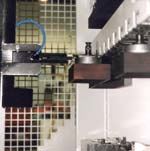
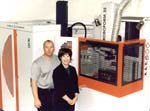
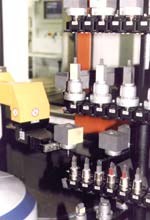
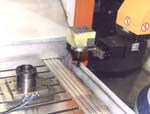
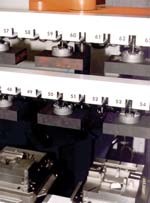
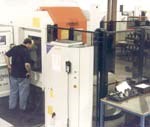
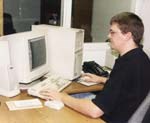









.jpg;maxWidth=300;quality=90)

